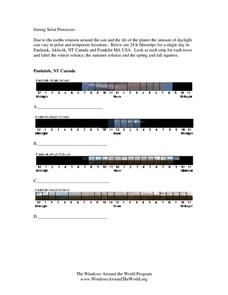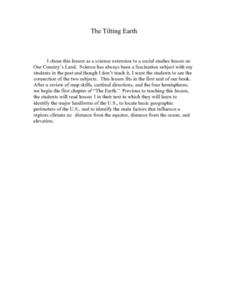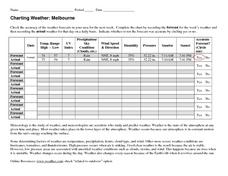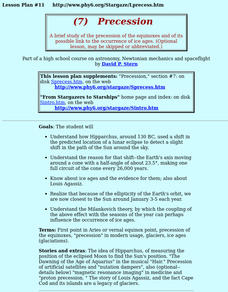Curated OER
Climate in Our Back Yard
Students construct a "A Year in Pennsylvania" poster on which they creatively describe at least three examples of how the climate they live in shapes their lives during every season of the year.
Curated OER
Spring-Aloud Read
Students study the season of spring and create stories about the season. In this spring season lesson, students read books about spring and discuss the season. Students then color and create a mini-book about Spring.
Curated OER
Sky 2: Shadows
students will explore making shadows and tracking the movement of an object over the course of a day to look for patterns. It is best to couple this shadow activity with reading the book, Bear Shadow, and making a map of Bear's...
Curated OER
Creative Position Word Center Activity
Students use positional words to describe the location of objects and demonstrate the ability to follow multi-step oral directions. Seasonal shapes are decorated in relation to the directions and positions stated by the positional word.
Curated OER
Shadow Trackers
Students use online websites to inquire about the cycle of day and night. In this web based lesson, students are able to see the movement of the sun and Earth. Students can look at different parts of the Earth as if they were on the Sun...
Curated OER
Fall Trees
Young scholars create fall trees using brown paper, tissue paper, background colors, glue, markers and crayons in this Art and Science lesson about the changing of seasons. Emphasis is placed upon learning about the Fall season and...
Curated OER
Solstice And Equiniox Curriculum
Learners engage in a lesson that investigates finding the dates of the solstices and equinoxes. They define the terms related to the concept and conduct research in order to explain the physical occurrences. They also relate to how the...
Curated OER
Seeing Solar Processes
In this seasons activity, students compare 24 hour filmstrips for a single day in Canada, the U.S.A., and the Arctic Circle to determine the different seasons. This activity has 12 fill in the blank.
Curated OER
Make Your Own Petroglyph!
Students create their own petroglyph. In this petroglyph lesson, students study and compare various petroglyphs. They create their own petroglyph to symbolize the seasons.
Curated OER
Cloud Haiku
Students listen as a haiku is read by the teacher, determining what season is being portrayed in the poem. Students work together as a class and create a model haiku, then complete a worksheet, completing their own poem. Students will...
Curated OER
Weather
In this weather instructional activity, students fill in the blanks to a poem about the seasons and sentences about the feel of the weather. Students complete 10 lines total.
Curated OER
Our Solar System
Students analyze the theories of the formation of the universe and solar system. Students analyze planetary motion and the physical laws that explain that motion: Rotation, Revolution, Apparent diurnal motions of the stars, sun, and...
Curated OER
Word Flowers
In this summer words worksheet, students read 29 words in large sunflower shapes that pertain to the season of summer. Each word is on a separate page; there are no directions. These could be flashcards or bulletin board pieces.
NASA
The Effects of Sunspots on Climate
In this sunspots and climate change learning exercise, learners use a diagram of a tree stump and its rings to determine the age of the tree. They use sunspot data from the internet and they construct an Excel spreadsheet to compare the...
Curated OER
The Tilting Earth
Fourth graders use a styrofoam ball on a stick to represent earth and a light bulb in the center of the room to represent the sun. They walk around the light, holding their sticks at an angle to show the tilt of the earth's axis. They...
Curated OER
Planet Earth
In this Earth activity, students review the characteristics of the Earth including it's rotation and revolution. This activity has 9 fill in the blank and 7 short answer questions.
Curated OER
Astrology: Fact or Fiction?
Students explore the topic of astrology and review the beliefs behind it. They read sample horoscopes. Using a portable digital planetarium, they view the night sky and the zodiac constellations. They examine and discuss the science...
Curated OER
Winter Weather Week Day 1: Weather Words
Students explore winter weather. In this winter weather lesson, students examine and define 22 weather-related terms. Students determine the words that have to do with winter weather.
Curated OER
The Radish Experiment
First graders grow radishes. In this Science lesson, 1st graders observe the growth of radishes in both the light and dark. Students discuss what plants need to live.
Curated OER
Charting Weather: Melbourne
In this earth science worksheet, students check the accuracy of the weather forecasts in their area for a week. Then they complete the chart by recording the forecast for the week's weather and then recording the actual weather for that...
Curated OER
Is it Really Winter in Australia? It is June!
The purpose of this activity is to determine how the location of a place on the Earth (hemisphere) determines what season that place is experiencing relative to the Sun's rays. Day one the students will be introduced to the terms...
Curated OER
How the Amount of Solar Energy Absorbed by the Earth is Dependent Upon the Earth's Position
Young scholars investigate the angle of light and how it faces the earth. They conduct a series of investigations with the following two objectives. Students determine if the angle of light is a factor in the absorption of heat. They...
Curated OER
Precession
Students explain how Hipparchus, around 130 BC, used a shift in the predicted location of a lunar eclipse to detect a slight shift in the path of the Sun around the sky. They examine the elliptical orbit in which the Earth travels around...
Curated OER
Predicting the Greening of Spring With Red Emperor Tulips
Students examine seasonal changes by watching tulip plant growth across the continent utilizing the Journey North website. They develop hypotheses as to why the plants emerge and grow where they do.

























